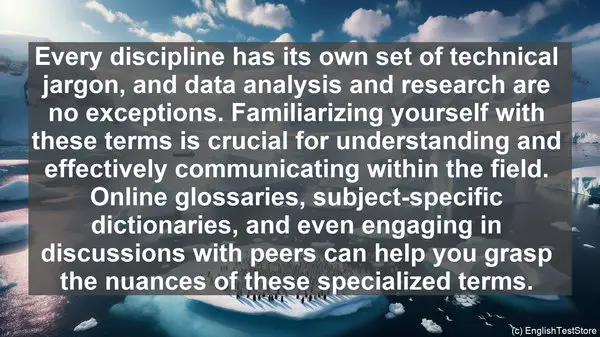Introduction: The Role of English in Advanced Data Analysis and Research
Welcome to today’s lesson, where we’ll delve into the crucial role of English in the realm of advanced data analysis and research. As the lingua franca of the scientific community, English serves as the primary medium for sharing knowledge, collaborating, and presenting findings. In this rapidly evolving field, it’s essential to not only possess technical expertise but also be adept at effectively communicating and comprehending complex information. So, let’s explore the top ten methods that will elevate your English proficiency and, consequently, your data analysis and research skills.
1. Building a Strong Vocabulary: The Foundation of Effective Communication
A robust vocabulary is indispensable for precise and nuanced communication. In data analysis and research, where accuracy is paramount, the ability to select the right word can make all the difference. Regularly reading scientific literature, technical papers, and relevant texts will expose you to domain-specific terminology, enhancing your vocabulary. Additionally, employing tools like flashcards or word association techniques can aid in retention and recall.
2. Mastering Technical Jargon: Navigating the Language of the Field
Every discipline has its own set of technical jargon, and data analysis and research are no exceptions. Familiarizing yourself with these terms is crucial for understanding and effectively communicating within the field. Online glossaries, subject-specific dictionaries, and even engaging in discussions with peers can help you grasp the nuances of these specialized terms.

3. Actively Listening and Taking Effective Notes: Maximizing Learning Opportunities
Whether attending a lecture, participating in a seminar, or watching an online tutorial, active listening is key. Train yourself to identify and extract the main ideas, supporting arguments, and key takeaways. Taking concise, well-structured notes not only aids in comprehension during the session but also serves as a valuable resource for future reference.
4. Leveraging Online Resources: The Vast World of Open Access
The internet has revolutionized the availability of research material. Numerous platforms provide open access to a wealth of scientific articles, journals, and databases. Familiarize yourself with these resources, such as Google Scholar, PubMed, or arXiv, and learn to navigate their search functions effectively. Additionally, many universities offer online libraries and subscriptions, granting access to a vast array of scholarly content.
5. Writing Structured and Coherent Reports: Conveying Findings Effectively
In data analysis and research, the ability to present findings in a clear, logical, and coherent manner is crucial. Familiarize yourself with the standard structure of research reports, including the abstract, introduction, methodology, results, and conclusion. Additionally, mastering the art of concise writing, using appropriate headings and subheadings, and employing visual aids like graphs or tables can enhance the clarity and impact of your reports.
6. Collaborative Writing: Harnessing the Power of Collective Knowledge
Research is often a collaborative endeavor, requiring the input and expertise of multiple individuals. When engaging in collaborative writing, establish clear communication channels, define roles and responsibilities, and utilize tools like version control systems or cloud-based platforms for seamless collaboration. Regularly providing and incorporating feedback from peers can also significantly improve the quality of the final output.
7. Effective Presentation Skills: Engaging and Informing Your Audience
Whether presenting your research at a conference, in a classroom, or during a team meeting, effective presentation skills are essential. Craft a compelling narrative, utilizing visual aids, such as slides or posters, to enhance engagement. Practice your delivery, ensuring clarity, appropriate pace, and non-verbal cues. Additionally, anticipate and prepare for potential questions, fostering a dynamic and interactive session.
8. Participating in Academic Discussions: Navigating Debates and Exchanging Ideas
Engaging in academic discussions, be it in a physical or virtual setting, provides valuable opportunities for knowledge exchange and critical thinking. Active participation involves not only expressing your ideas but also actively listening, acknowledging and building upon others’ contributions, and respectfully challenging or seeking clarification. This collaborative discourse fosters a rich learning environment.
9. Staying Updated with the Latest Research: The Importance of Continuous Learning
Data analysis and research are dynamic fields, with new discoveries and methodologies emerging regularly. Actively staying updated with the latest research, through methods like subscribing to relevant journals, attending conferences, or participating in webinars, ensures you’re at the forefront of knowledge. Additionally, engaging in online communities, such as forums or social media groups, provides avenues for discussions and networking.
10. Seeking Language Support: Resources for Further Enhancement
Finally, don’t hesitate to seek language support when needed. Many universities offer language centers or writing labs that provide guidance and feedback on academic writing. Online platforms, such as language exchange forums or professional editing services, can also be valuable resources. Remember, language proficiency is a continuous journey, and availing these resources can aid in your ongoing development.

